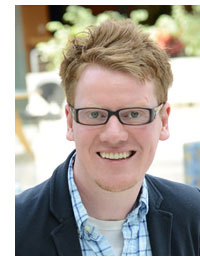
Empty stage. (Photography by Isabelle Adam, CC BY-NC-ND 2.0)
Chicago Booth assistant professor Ed O’Brien uses what we find funny to explain our behavior.
Booth social psychologist Ed O’Brien wants it on the record that he does do traditional literature searches, reading through the published works of others to find new research topics. He just gets a lot of his ideas from comedians too.
 A stand-up comedy fan, O’Brien realized that the funniest jokes tap into universal human behaviors and feelings. “I noticed that a really successful comic is able to say something where most people are like, ‘Oh, that’s true,’” says O’Brien. “And that’s kind of what a research psychologist’s job is, to figure out what’s true for a majority of people.”
A stand-up comedy fan, O’Brien realized that the funniest jokes tap into universal human behaviors and feelings. “I noticed that a really successful comic is able to say something where most people are like, ‘Oh, that’s true,’” says O’Brien. “And that’s kind of what a research psychologist’s job is, to figure out what’s true for a majority of people.”
One bit that stuck with O’Brien was on an episode of British comedian Ricky Gervais’s popular podcast. Gervais and his cohosts were talking about how they usually eat most of a bag of chips without much thought, but when they get to the last chip, it “takes on this aurora of specialness that they really slow down, they think about it, they miss it,” recalls O’Brien.
That inspired O’Brien to explore what he calls “the power of the last.” In a study later published in Psychological Science, his research team asked 52 University of Michigan students to evaluate five different flavors of Hershey’s Kisses. All of the students were handed the Kisses randomly one by one to taste and rate; only some were told before they tried the fifth chocolate that it would be the last one.
The study found that 22 percent of the participants who were told the fifth Kiss was simply the next chocolate in the taste test said it was their favorite, but about two-thirds of those who knew it was the last said that it was the best. “They enjoy chocolate number five much more when it’s simply framed as, ‘Oh, this is the last one I get,’” says O’Brien. His findings were covered by NPR, the Huffington Post, and other media outlets, and O’Brien conducted several follow-up studies “purely based on this Ricky Gervais bit.”
O’Brien says he initially had hesitations about using comedy as a genesis for his studies, but a “really, really amazing” Screwtape Letters–esque paper by University of Michigan social psychologist Richard Nisbett helped him embrace nontraditional sources of inspiration. Instead of just reading others’ work and ending up feeling “paralyzed” because so many topics have already been studied, says O’Brien, Nisbett advocates looking for ideas “out in the world, because it’s going to make you more excited, more inspired—you’re going to see what’s relevant for today.”
A focus on relevancy is one of the reasons O’Brien was drawn to the business school. Most psychology departments focus on laboratory findings; at Chicago Booth there’s a “nice balance” between study data and connecting to real-world applications, he says. He shares the origin and results of his chocolate taste test with MBA students to help them see how, for example, they might be biased toward the last candidate interviewed, and is currently working with a PhD student to apply findings on perceived improvement and decline to how fluctuations in GDP affect how people view their own finances.
After a year at Booth, “when I think of an idea or something that Ricky Gervais says that’s really interesting, my mind still goes to, how can I design a clean study for this?” says O’Brien. “But now, it’s also going to, how can I convince an economist that this is interesting? And how does this relate to something really big in the world?”
